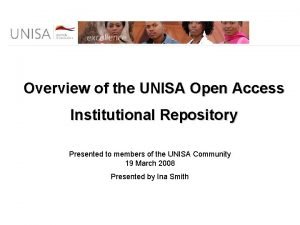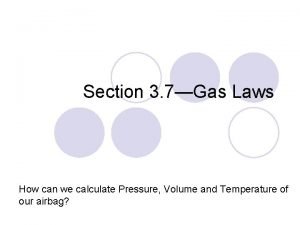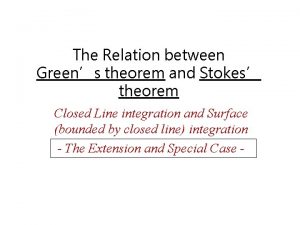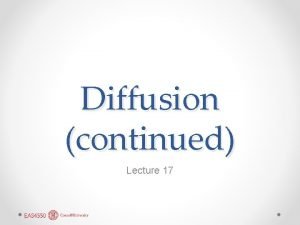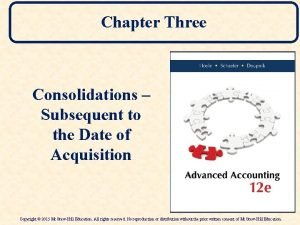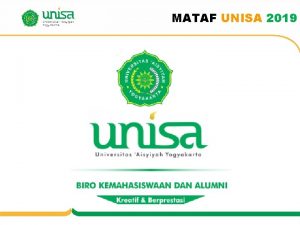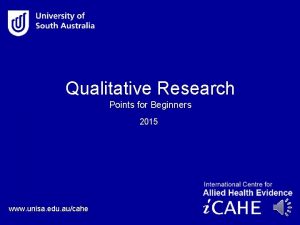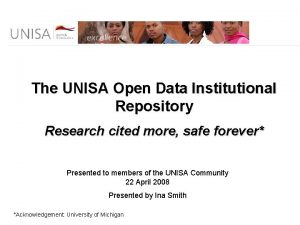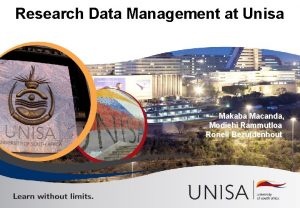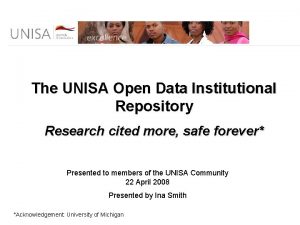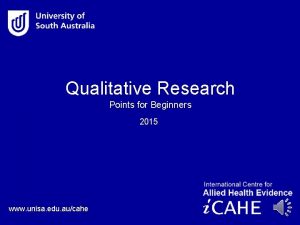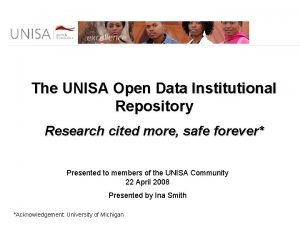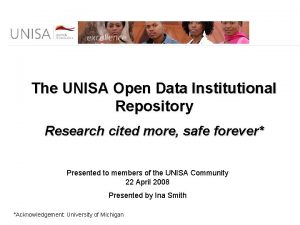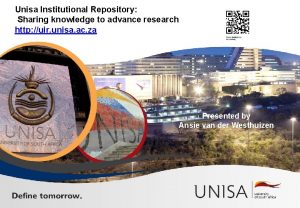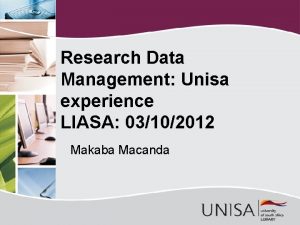UNISA MY RESEARCH AND HOW IT RELATES TO











- Slides: 11

UNISA MY RESEARCH AND HOW IT RELATES TO UNISA’S IOP RESEARCH OBJECTIVES Presented by Mtholeni N. Ngcobo Young Academics Programme 15 May 2009

My research • Falls within two fields in linguistics: Sociolinguistics and Corpus linguistics • Sociolinguistics has 3 parts (Hymes) i. Social problems, e. g. education and language policy ii. Socially realistic linguistics – it uses variation and validity to challenge formal linguistics , e. g. Labov’s language variation and change iii. Socially constituted linguistics – social function gives form to linguistics

My research • My focus is more on social problems and socially realistic linguistics • On the side of corpus linguistics, I use corpus linguistic approach as a methodology of linguistic research • Corpus linguistics approach involves collecting large corpora of a language and storing it in a computer for further language research • The computer is also used for analyzing language corpora during research

My Sociolinguistics research • I have explored the politics of compromise in language planning in South Africa • I have also produced articles based on my research on language planning and policy in South Africa • The politics of compromise and language planning: the case of South Africa (upcoming 2009), deals with the political development of language planning and policy throughout different historical periods in South Africa. • I argue that the new language policy in South Africa today illuminates the sociopolitical history of the legislated languages and it reflects the politics of compromise in its discourse (Bellamy 1999)

Socioling… • The other article entitled: “On Account of a Basket”: a socio-historical and ethnographic perspective on the development of multilingualism in South Africa (2008), from an Indigenous Knowledge Systems approach tries to reveal why we have so many languages in South Africa. • In the article I argue that people had always used their languages as important symbolic resources and for the creation of the structured social disposition (Bourdieu 1991)

Socioling… • The other article entitled: Language planning, policy and implementation in South Africa (2007), addresses the issues of language planning and language policy implementation in South Africa • I argue that status language planning should be complemented with corpus language planning, as the latter is the most accepted modern first step to address the problem of language policy implementation • But I also argue that creating new terms and encouraging the use of languages in all domains require the use of modern conventions

Socioling… • a) b) That is why in another article entitled: A strategic promotion of language use in multilingual South Africa: information and communication (upcoming 2009), I present and discuss strategies for encouraging the use of all official languages in South Africa from a language management perspective Making information available in all official languages (using ICTs) – developing a norm and increasing valence Communication – Creating expectation for language use by those who are influential in the public service professional context

Corpus linguistic approach • In a collaborative article (with Britta Zawada) entitled: A cognitive and corpus linguistic reanalysis of the acquisition of the Zulu noun class system (2008), we challenge formalism in the study of language • The result of this research showed clearly that Zulu noun class system is, in fact, grounded in conceptual notions such as prototypicality, frequency and ease of acquisition

How does this Relates to UNISA’S IOP Research Objectives • Since UNISA has created an environment that encourages research, this has allowed me to participate in workshops, seminars and local conferences – I am beginning to establish a good profile among the prolific scholars in the area of language planning • At the moment I publish an average of two accredited articles per year – very soon my research output will increase per annum • The following research is in the pipeline:

How does this Relates to UNISA’S IOP Research Objectives • Zulu noun classes revisited: a corpus linguistic approach; A sociolingustic approach to Zulu noun classification; Using language corpora in the intellectualization of indigenous languages • I am hoping to apply for rating very soon since UNISA wants to increase the number of NRF-rated researchers • I am currently working with other colleagues in a strategic project aimed at developing a Corpus Resource Centre – the funding is from UNISA • The center will encourage research by allowing researchers to obtain language corpus data for their individual research – the spin-off is increase output and the emergence of more rated researchers

I THANK YOU
 Unisa institutional repository
Unisa institutional repository What gas law relates pressure and temperature
What gas law relates pressure and temperature Section 13.2 the combined gas law and avogadro's principle
Section 13.2 the combined gas law and avogadro's principle What formula relates moles, mass and mr?
What formula relates moles, mass and mr? 11-1 inverse variation
11-1 inverse variation Greenes theorem
Greenes theorem Ficks laws
Ficks laws Hooke’s law relates
Hooke’s law relates If vince charged $200
If vince charged $200 Which of the 4 ps relates to warehouse inventory?
Which of the 4 ps relates to warehouse inventory? The formula c=5p+215 relates c
The formula c=5p+215 relates c Consolidation entry asterisk c relates to
Consolidation entry asterisk c relates to
